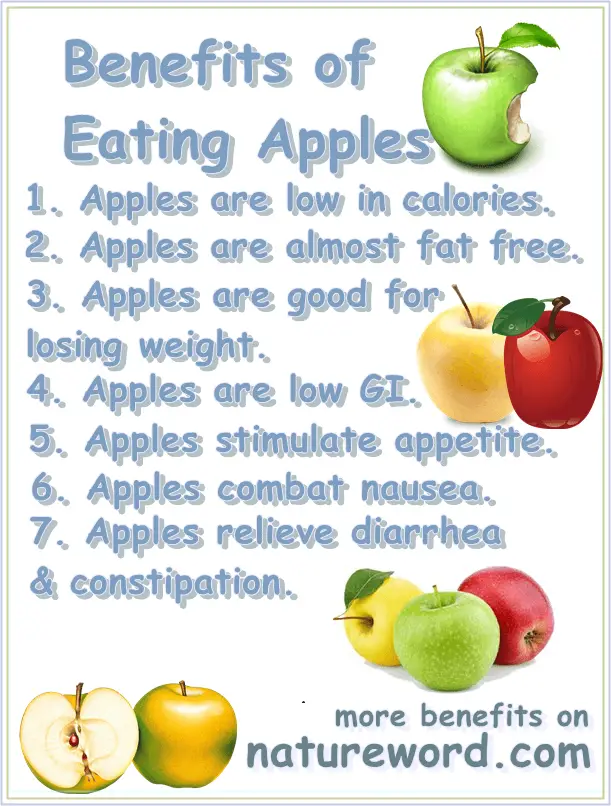Almost everyone eats apples. Even if you like strawberries better than apples, or bananas, or peaches or pineapple, chances are you’ve eaten apples at least as often as you’ve eaten your favorite fruit. But the fact is apples are not very nutritious. There are plenty of other fruits that are far healthier and better for you than apples. But if apples are your favorite fruit, and you eat them often, then you must be interested in knowing what are their benefits. Real, measurable, quantifiable benefits.
What are the benefits of eating apples?
Apples are low in calories
How many calories in apples? A serving of 100 grams of raw apple with skin has, on average, 48 to 65 calories or kilocalories (kcal), depending on the variety and degree of ripeness of the individual fruit. How many calories in one apple? One small apple at an estimated weight of 130 grams provides 62.5 calories to 84.5 calories. One medium apple at an estimated weight of 160 grams has 77 calories to 104 calories. One large apple at 215 grams has 103 calories to 140 calories.

Eating apples helps curb hunger
Eating apples helps curb hunger, but only if you eat them with skin. Apples, and especially apple skin, have dietary fiber to help fill you up and combat hunger. How much fiber in apples? There are 2.1 to 2.5 grams of dietary fiber per 100 grams of apple with skin. Apples are also around 85% water which further helps with satiety, as well as hydrates.
Apples benefits for weight loss
Apples are genuinely good for weight loss. If you are embarking on a weight loss, then you likely have to eat low-calorie to various degrees, whether it’s a low-carb diet, low-carb and high protein diet or another type of diet. What are the benefits of eating apples for weight loss?
- Apples are low in calories – the low calorie density helps you cut down on your daily intake of calories and lose weight.
- Apples have dietary fiber that curbs hunger and fills you up until your next meal.
- Apples are very low in fat with only 0.17 grams of fat per 100 grams, the same fat content as in 100 grams of egg whites.
- Apples are high in water which helps hydrate and fill you up, helping you last until your next meal.
If you’re looking to lose weight, it’s actually helpful to include apples in your diet. Here are some examples of how to eat apples to lose weight:
- Raw apples with skin, eaten by themselves, as a snack or to curb hunger when you’re feeling like eating but really shouldn’t.
- An apple, chopped and cooked with a little water, seasoned with cinnamon and maybe a teaspoon of raw honey or 5 grams of brown sugar. Eaten by itself as a snack, or used as a low-calorie topping for morning oats porridge or high-protein breakfast pancakes.
- Raw or cooked apple in salads.
- Cooked apple eaten as a side dish to a main meal.
- Apple puree made from apples cooked in water for when you are craving something sweet.

Apples stimulate appetite
Eating apples can both help curb hunger and stimulate appetite. Effects are different depending on the person and apple variety. For example, while sweeter, lower acidity varieties such as Golden Delicious satisfy sweet cravings and curb hunger, keeping you satisfied until your next meal, more acidic apple varieties, say Granny Smith, can actually make you hungrier by stimulating appetite.
Organic acids occurring naturally in apples, that is, compounds responsible for the tartness in the fruit, are what stimulate appetite. And that can be a good thing. If you’re feeling sick to the stomach and nausea is preventing you from eating anything, then a chilled tart and sweet apple might just kickstart your appetite, or be the only thing you can keep down.
Apples benefits during pregnancy
Nausea is extremely common during pregnancy, with some women not being able to keep anything down. But a sweet and tart apple can help combat nausea, and associated vomiting, and even help restore appetite. It’s even better if it’s been chilled in the refrigerator or freezer beforehand. Apple sauce, which is a balanced mix of sweet-tart and bland, depending on cooking time, can also be something pregnant women can keep down.
Apples benefits for babies
What are the benefits of apples for babies? Apple puree made from apples is a great food for diversification, and can be successfully introduced in babies’ diets from around 6 months of age. Apples puree is more than an acceptable option when first starting babies on solid foods. For one, it’s soft and easy to swallow so it doesn’t represent a choking hazard unlike other foods.
Also, apple puree is greatly favored by babies due to its mushy texture and slightly sweet taste. Lastly, the cooking process reduces the natural acidity of the apples so there’s lower chances of acid reflux or stomach upset, as well as no risks of foodborne illness.
Apples raise blood sugar levels and have tonic effects
Eating an apple can have restorative properties. Apples have 13 to 15 grams of carbs per 100 grams of fruit, most of which are simple sugars such as fructose and glucose. The sugars in the fruit are absorbed rapidly into the bloodstream where they raise blood sugar levels, giving the body quick energy to use. If you have low blood sugar, aka hypoglycemia, and are feeling tired, lethargic, or about to faint, then just one apple can help prevent that, exerting a tonic action.
Apples don’t raise blood sugar levels excessively
While apples do raise blood sugar levels, they don’t raise blood sugar excessively which is a good thing. Apples are naturally low glycemic foods. The average GI score for apples is 39, determined for all commercial varieties.
Good for nausea and vomiting
Apples have poor nutritional value, and yet they are a source of many benefits for health, including benefits for nausea and vomiting. Fresh apples help combat nausea via the organic acids they contain such as malic acid and citric acid. These acids are what make fresh apples taste tart. Cooked apples help combat nausea and vomiting because they are relatively bland, with just a little sweet and tart flavor to get you to eat.
Hydrating fruit
While it may not seem like much in the grand scheme of things, one of the benefits of apples is that they are hydrating fruit. An apple is 85% water and helps keep you hydrated. Adequate levels of hydration help maintain blood volume and contribute to benefits for blood pressure.
Good to eat for diarrhea
What makes apples a good food to eat for diarrhea? Eating apples helps combat diarrhea thanks to the pectin in the fruit and especially the fruit skin. Pectin is a type of soluble dietary fiber with gelling properties. Pectin essentially helps bind stools that are too loose which is what relieves diarrhea. After citrus fruit rind and rose hips, apples are the next best source of pectin.
Good to eat for constipation
Apples are good to eat for both diarrhea and constipation. Pectin, the same dietary fiber that binds loose stools, softens stools that are too hard to pass. Pectin is not digested per se, but rather passes through the digestive tract. But because of its gelling nature, it absorbs water. When it’s incorporated into stools, it helps attract water into them, making them softer and easier to pass which is how it relieves constipation.
Apples benefits for teeth
They say that, if you eat apples, you don’t need to brush your teeth anymore. That’s partially true. While it doesn’t eliminate the need to brush your teeth, eating apples does help clean teeth – organic acids in the fruit such as malic acid and citric acid help dissolve small food particles which makes teeth feel cleaner. But at the same time, organic acids sensitize teeth because they slowly erode tooth enamel. This is why some people don’t like to apples, or other more acidic fruits.
The small content of vitamin C in apples also provides minor benefits for teeth and gums. Vitamin C contributes to blood vessel integrity and helps maintain the health of capillaries, tiny blood vessels that oxygenate gums. What vitamin C does is support gum health and prevent gum retraction which, in turn, contributes to teeth health. Vitamin C is historically known for preventing teeth loss due to scurvy.
Apples benefits for skin
Apples provide minor benefits for skin due to their content of vitamin C. Vitamin C is scientifically proven to stimulate production of collagen for better skin elasticity. Getting lots of vitamin C in your diet can help prevent early wrinkles. However, studies show vitamin C produces measurable effects on health starting from 500 mg a day, and apples provide only 4.6 mg per 100 grams of fruit.
